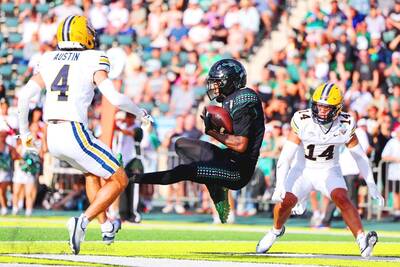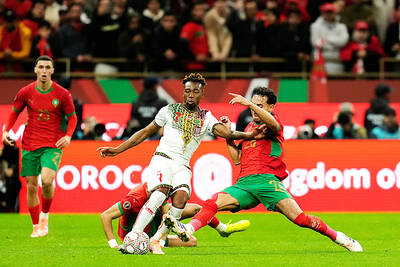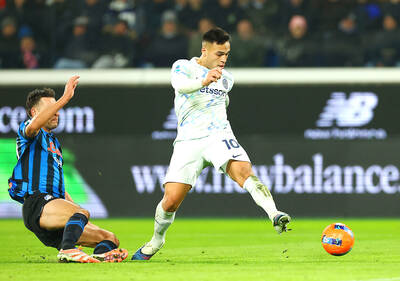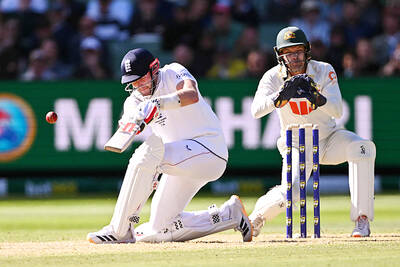Taiwan’s International Olympic Committee (IOC) presidential candidate Wu Ching-kuo believes Cuba’s historic first professional boxing bout in more than 50 years proves yet again to IOC members that he can deliver.
The 66-year-old president of the International Boxing Association (AIBA) is one of six men vying to succeed retiring IOC president Jacques Rogge at the election on Tuesday next week in Buenos Aires, Argentina.
Wu said he was proud to have been the facilitator of engineering the Cuban return to the professional boxing circuit.
That moment arrived when they took on Mexico last week under the AIBA’s mantle of the World Series of Boxing (WSB).
Cuban boxers have dominated amateur boxing at Olympic and world championships — producing legends such as the late Teofilo Stevenson and Felix Savon — but they have been barred from competing professionally since former Cuban president Fidel Castro took power in 1959.
However, Wu — who set up the WSB to stop leading amateur boxers from turning wholly professional after Olympic Games, allowing them to earn money, but be eligible to still compete at amateur championships — persisted in his goal of persuading them to compete in what are five-round bouts as opposed to three at amateur level.
They proved that was no hindrance to their abilities over the shorter bouts and fighting under the team name of the Domadores (Tamers) they whipped the Mexican Guerreros 7-3, leading Wu to exult in seeing history made under his stewardship.
“My goal since I took over the AIBA has been to develop boxing,” he said by telephone from Mexico City. “I went to Cuba three times over the past couple of years and on the third occasion, I went in January this year, I convinced them that this is the future development of the sport. I said to them that if you refuse then you risk losing your position as the world No. 1 in amateur boxing.”
“I told them you have three months to consider and last week history was made as Cuban boxers fought under professional rules in the volleyball stadium for the 1968 Olympics,” he said.
“It has been one of my most difficult jobs as AIBA president, but I am very, very happy and proud at the outcome,” he added.
Wu, an acclaimed architect who was born in China, but left with his parents when he was a toddler, has revolutionized amateur boxing since he assumed the presidency in 2006.
He is credited with cleaning it up and introducing women’s boxing into the Olympic program, which contributed to what was considered one of the outstanding sporting spectacles at last year’s Olympics.
“I think what happened over the last seven years, everyone, including IOC members, have noticed the reforms and the improvements, and how I have overcome difficult issues,” Wu said.
“IOC members have paid me lots of compliments, as when I took the job on they said to me: ‘You face an impossible task, these measures will take 20 years.’ I replied: ‘I deliver on my promises.’ I had 64 items listed in my manifesto in 2006 and all of them have been delivered. I made it very clear when I took over that I wanted boxing people to be proud of their sport again,” he said.
Wu, who says that the IOC should work alongside the UN in trying to preserve world peace, said that he had the necessary qualities to be IOC president.
“This Cuban experience is positive for me. It confirms to people once again that when I promise something, I deliver. I have the determination, I have the ability to execute and to implement,” he said.

Backup quarterback Luke Weaver on Wednesday night threw a 22-yard touchdown pass to Nick Cenacle with 10 seconds left, as the University of Hawaii rallied for a 35-31 comeback victory over the University of California, Berkeley in a thrilling Hawaii Bowl. Weaver entered the game after Micah Alejado took a hard hit on the previous play. With the Rainbow Warriors (9-4) in range for a tying field goal, coach Timmy Chang took a shot at the end zone, and Cenacle got between two defensive backs and made the contested catch. “How amazing is that?” Chang said. “It’s a program that is built

Hosts Morocco on Friday were held to a 1-1 draw by Mali at the Africa Cup of Nations, ending their world record run of wins and leaving them still to make sure of progress to the next stage. Midfielder Brahim Diaz tucked away a penalty in stoppage-time at the end of the first half, but Mali equalized from the spot midway through the second half through Lassine Sinayoko. Both penalties were awarded after video reviews in a tempestuous clash at the end of a busy day of action at the tournament. Morocco were atop the Group A standings with four points, while Zambia,

STILL IN THE HUNT: Rasmus Hojlund took his goal tally for SSC Napoli to nine as the champions cruised to a win at US Cremonese and stayed two points behind the leaders Inter on Sunday stayed at the Serie A summit after beating Atalanta BC 1-0 to maintain their slender lead over local rivals AC Milan. Lautaro Martinez netted the only goal of the game in Bergamo for Inter, who lead Milan, 3-0 winners against Hellas Verona thanks to Christoper Nkunku’s first Serie A goals, by a single point at the top of the division. The Argentina striker has scored in four consecutive league matches to end what has been a tricky year in positive style. “I ended last season in a lot of pain... I kept going during the Club World Cup and international

An astounding 20 wickets fell on a frantic first day of the fourth Ashes Test yesterday, with Australia all out for 152 before storming back to dismiss England for 110 and leave the clash on a knife-edge. England skipper Ben Stokes won a key toss on a green track and his quicks feasted after sending in the hosts under overcast skies in front of 94,199 fans at the Melbourne Cricket Ground. It was the biggest cricket crowd ever at the cavernous arena, exceeding the 93,013 who watched the 2015 World Cup final, and they witnessed the home side collapse with Josh Tongue